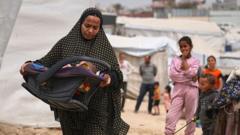In the midst of ongoing conflict, pregnancy and childbirth in Gaza have transformed into harrowing experiences filled with anxiety and fear. With the pervasive violence, acute shortages of food, and medical supplies, countless mothers are now faced with grave health threats to themselves and their newborns. According to the United Nations, the harsh conditions have led to alarming rates of underweight and premature births, as well as increased incidents of miscarriages and stillbirths.
At Nasser hospital in Khan Younis, the dire circumstances impact pregnant women like Malak Brees, who fears for her baby's health amid the chaos. "I'm terrified of a premature birth," she shared, highlighting how malnutrition and exhaustion have worsened her pregnancy. The ongoing Israeli blockade on Gaza has exacerbated health crises, creating severe disparities in access to essential medical resources. Recently, the blockade was partially eased, but it continues to hinder access to basic necessities, including hygiene products and medical equipment.
Childbirth has also become perilous as women now often deliver in makeshift shelters rather than hospitals. "Mothers who manage to reach the hospitals are sent home just hours after giving birth, often with compromised infants who require prolonged care," noted Sandra Adler Killen, an emergency nurse working in the region. The overwhelming demand following a recent bombing that rendered another key hospital inoperative has left caregivers forced to discharge patients prematurely, leading to a looming crisis for maternity care.
Dr. Ahmad al-Farra, who heads maternity care at Nasser, describes the psychological burden on expectant mothers who understand that their nutritional needs remain unmet, potentially resulting in low birth weight or other complications. With nearly 55,000 pregnant women in Gaza facing similar challenges, the absence of routine prenatal care signals an alarming trend.
Aya al-Skafi's tragic experience encapsulates the grim reality for many; her daughter, Jenan, succumbed to malnutrition as shortages in food and maternal health affected her ability to provide necessary nourishment. "I begged for help, but only God answered," a heartbroken Aya recalled, illustrating the desperate cries of countless mothers struggling for their children's survival.
Support initiatives, although limited, are underway. The Gaza Infant Nutrition Alliance aims to assist mothers facing malnutrition and breastfeeding challenges. Yet, the stories emerging from frontline healthcare workers like Sandra highlight an increasing sense of despair among women who are losing children, with the repercussions of conflict deeply embedding trauma alongside the natural joy of new parenthood.
With familial and community structures disrupted by ongoing military actions, the typical support systems that many women relied upon are frequently absent. The heartbreaking case of pharmacist Jomana Arafa, who died shortly after giving birth to twins, underscores the enormity of their struggles and the violence that has deeply scarred their lives.
In summary, the stark realities of pregnancy and childbirth amid the conflict in Gaza paint a painful picture. Instead of being moments of joy, these experiences have become fraught with risk and uncertainty, underscoring the profound humanitarian implications of the ongoing crisis. As each new life is brought into this shattered landscape, it symbolizes not hope, but the relentless fight for survival.


















